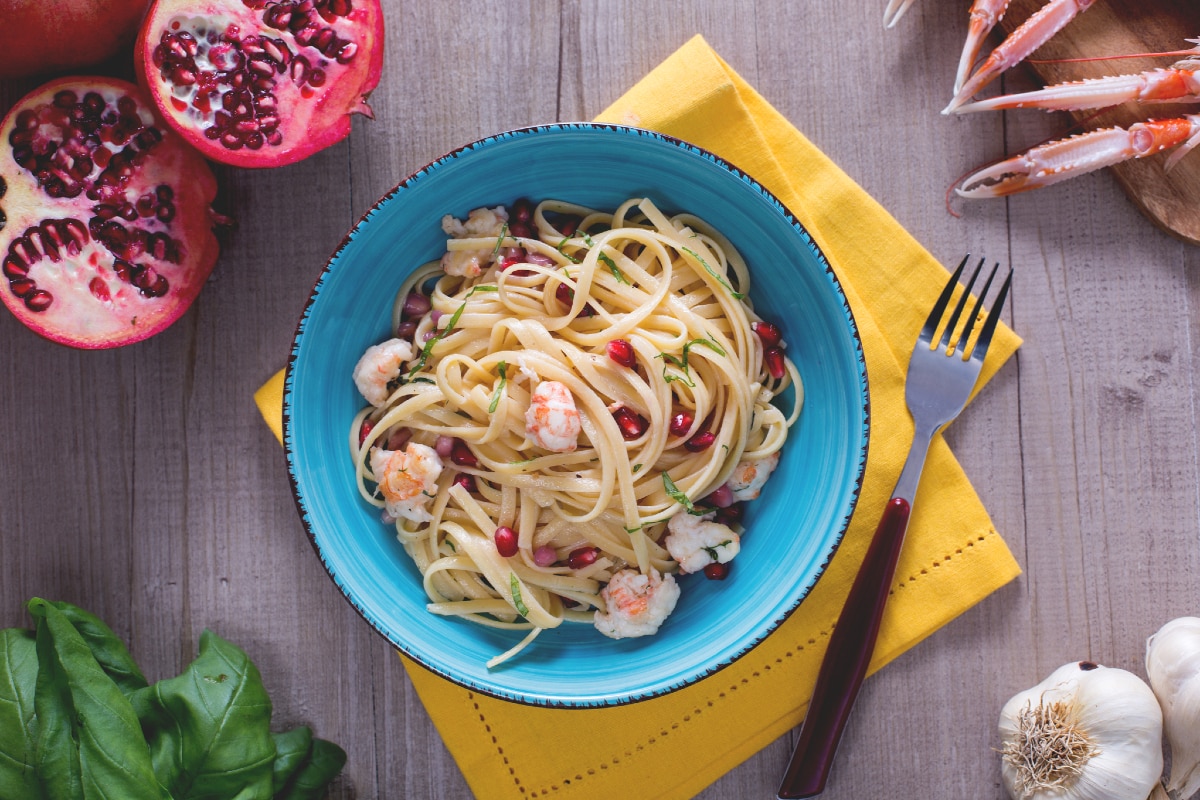Bavette with scampi and pomegranate

- Lactose Free
- Energy Kcal 378
- Carbohydrates g 73.1
- of which sugars g 8.8
- Protein g 17.6
- Fats g 0.7
- of which saturated fat g 0.13
- Fiber g 3
- Cholesterol mg 94
- Sodium mg 395
- Difficulty: Easy
- Prep time: 15 min
- Cook time: 10 min
- Serving: 4
- Cost: Low
PRESENTATION
Bavette with scampi and pomegranate is a fresh twist on the classic Italian seafood recipes. And the scampi? They're juicy, mingling with long, flat bavette pasta, a classic from coastal Italy. But here's the thing: pomegranate. It’s not just there for show—it cuts through the rich seafood flavors, adding a bit of tangy brightness. Fans of traditional scampi pasta recipes will love how the sweet yet sharp pomegranate balances the sweet notes in the scampi. It's like a celebration on a plate, really. Vibrant colors, flavors that pop.
In Italy, pomegranate is a winter symbol of luck and prosperity, so this dish is a favorite for Christmas and New Year’s Eve. It might sound like just noodles and seafood, but this bavette scampi recipe with its pomegranate twist is special. Perfect for holidays or when you want to impress. The way the glossy pomegranate seeds tuck themselves between the pasta strands? Seriously cool. They're like little gems.
It’s not just pretty; every bite is a mix of tender pasta, slightly moist seafood, and pops of fruit. Compared to other scampi and pomegranate dishes, this one is light and festive. It stays true to its Italian roots but is a bit bold. You get all that Mediterranean pasta comfort, but with a fresh twist. If you want a scampi pasta recipe that’s modern yet traditional, this is for you. Pretty much, it’s crisp and magical—when tradition meets something new.
Whether you’re sharing it with friends or savoring it solo, this dish promises delight and a nod to Italy’s culinary creativity—really really special. For real, you’ll love it. Bavette with scampi and pomegranate offers all the comfort of classic Mediterranean cuisine with that exciting edge. Cannot go wrong here.
You might also like:
- INGREDIENTS
- Linguine pasta 0.7 lb (320 g)
- Scampi 1.1 lbs (500 g)
- Pomegranate 3.5 oz (100 g) - the seeds
- Basil 4 leaves
- Garlic 1 clove
- White wine 1.8 oz (50 g)
- Fine salt to taste
- Black pepper to taste
How to prepare Bavette with scampi and pomegranate

To prepare the bavette with scampi and pomegranate, start by rinsing the basil and cutting it into thin strips 1. Proceed with the How to clean shrimp: remove the head 2 and with scissors, cut the shell under the belly 3 to facilitate the removal of the carapace.

After removing it, use kitchen tweezers to eliminate the intestine; if you don't have tweezers, you can lift it with a toothpick and then pull it out by hand 4, being very careful not to break it to avoid leaving any part attached to the crustacean. Now, cut the scampi into small pieces of equal size 5. At this point, boil the bavette in plenty of salted water 6.

While the pasta is cooking, take a non-stick pan and brown a clove of garlic in its skin with the oil 7. When it is browned, remove it. Now add the scampi pieces 8 and cook them over high heat for about 2 minutes, stirring to prevent them from sticking to the bottom of the pan. Season with salt and pepper. Then, deglaze with white wine 9, letting it evaporate.

At this point, the pasta will be al dente: drain it directly into the pan with the fish 10 and add 1 ladle of pasta cooking water to finish its cooking 11. When it is completely dry and absorbed by the pasta, also add 50 g of pomegranate seeds, keeping the other half to decorate the dish 12.

Season with basil 13 and mix the ingredients well so the aromas blend 14. Finally, plate your bavette with scampi and pomegranate and enjoy while still hot, garnishing with the remaining 50 g of pomegranate seeds which will give a vibrant color to the dish 15!